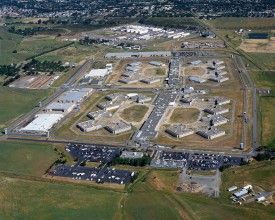California continues tussle with ex-offender employment
The good news is that the California Department of Corrections offers program to help inmates become opticians.
The bad news is that there are four different state statutes that allow the state to refuse to license an ex-offender as an optician, established in explicit language in the law.
It’s the riddle of reform, as California’s prison inmate population dropped 17 percent between 2005 and 2014 while the number of individuals on parole dipped 61 percent.
Where do they go, though?
Ineligible for employment
Both stats are relatively sunny reflections on Gov. Brown and the state Assembly’s effort to reduce both crime and criminals.
Among other things, the state hiked credits toward early release for non-violent and minimum custody offenders and established a new parole system for non-violent second time criminals.
But if you’re looking for a job and have been convicted of a crime involving a controlled substance – and this includes marijuana – forget about getting work on an ambulance crew, a litter van, or a wheelchair van. You could become a real estate broker, a midwife or a speech pathologist, but you’d have to make a case for it.
Any misdemeanor will keep you from working at as a smog check station attendant, a locksmith, a repo man or board member of a humane society.
The information comes from a database assembled by the American Bar Association. Users can search dictates in each state for how a conviction of a variety of crimes can affect a person’s ability to get a job, a business license, a judicial position, housing, education and 10 other endeavors.
The findings can be comforting – someone with a felony conviction can’t serve on a grand jury – and amusing, as a felon is also ineligible to participate in the cap-and-trade program for greenhouse gas emissions.
Contradictions in law
The database also exposes the contradictions in the law regarding employment restrictions on inmates. In California, “not much work has been done on fixing the employment and licensure issues,” said W. David Ball, an associate professor at Santa Clara University School of Law.
“These laws are generally written broadly, and there are laws that are easy to understand, like you would not want someone who was involved with financial fraud to be a CPA,” Ball said. “But it makes no sense that someone convicted of drunk driving can’t be a cosmetologist.”
The ABA database is part of a broad effort to loosen restrictions on ex-offenders. There is a national move to create a bill in all states forcing them to examine their laws regarding ex-offenders and employment. Advocates claim passage would bring recidivism rates down.
In California, 61 percent of felons returned to prison within three years, according to a 2014 annual state report on recidivism.
The study found that “inmates committed to prison for property crimes consistently recidivate at a higher rate than those committed for other types of crimes, including crimes against persons, drug crimes, and ‘other’ crimes.”
The move to a national retooling of restrictions on ex-offenders is not welcomed by all parts of the legal community.
Too soft on criminals?
“This was like a liberal do-gooder thing,” James Bopp, a Terre Haute, Ind., lawyer told the Wall Street Journal earlier this month. “The law is constructed in a way to grossly favor the criminal who is seeking relief from these collateral effects of their conviction.”
The passage in November of Proposition 47 pruned the ranks of the incarcerated even more, as the law softened criminal classifications for some crimes including drug possession and shoplifting. It also made the theft and reception of stolen goods under $950 a misdemeanor.
Under Prop. 47, part of the projected $400 million to $700 million projected to be saved statewide by cutting down on the state’s incarceration bill is to be spent on mental health and substance abuse services.
Such services, while they can help treat an ex-offender, also exclude the ex-offender community: A misdemeanor conviction excludes a person from becoming a vocational nurse, treating an adolescent in a drug treatment program or obtaining a psychiatric technician license.
Additional legislation
Lawmakers are still making adjustments to the effects of the bill, plugging holes and shaping the mandate. Some are concerned that a provision in the measure would allow the theft of a gun to be lumped in with stealing a bag of Twizzlers in the under $950 category.
A measure authored by state Sen. Cathleen Galgiani is winding its way through the statehouse, seeking to fix that, making the theft of any firearm a crime not subject to the parameters of Prop. 47.
Another bill, SB205, looks to fund a university study of the effects of Prop. 47.
Still another bill, SB527, seeks to allocate money from the expected corrections savings for truancy and dropout prevention, funding over four jobs for that task alone.
Collateral consequences are also often unintended consequences, said Ball, the associate professor at the Santa Clara law school.
“I’d like to raise the bar higher so you have to make a case for ‘why not?’ rather than reasons to impose,” Ball said. “These collateral consequences really do prevent people from starting over.”
Steve Miller can be reached at 517-775-9952 and [email protected]. His website is www.Avalanche50.com
Related Articles
California legislators launch push to expand health care coverage to undocumented immigrants
State Sen. Ricardo Lara, D-Bell Gardens, is renewing his push to reform health care in California, this time proposing new
CA’s Tesla challenges other states’ dealership laws
California’s Tesla Motors Inc. is proving as revolutionary in selling cars as making them. It’s challenging states that mandate new
Sen. Gaines is suing Covered California
Obamacare’s most vocal critic in the California Legislature has announced that he will be filing a lawsuit Wednesday against Covered California.





